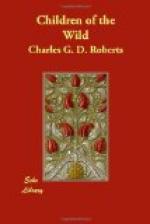“Well, you know, you’re not a bat,” said Uncle Andy sententiously. “If you were you’d probably think it much pleasanter, and far less dangerous, than being left at home alone while your mother was out swooping ‘round after moths and June bugs.’”
“Why?” demanded the Child promptly.
“Well, you just listen a bit,” answered Uncle Andy in his exasperating way. He hated to answer any of the Child’s most innocent questions directly if he could get at them in a roundabout way. “Once upon a time”—("Ugh!” thought the Child to himself, “this is going to be a fairy story!” But it wasn’t). “Once upon a time,” went on Uncle Andy slowly, “there was a young bat—a baby bat so small you might have put him into your mother’s thimble. He lived high up in the peak of the roof of an old barn down in the meadows beside the golden, rushing waters of the Nashwaak stream, not more than five or six miles from Fredericton. We’ll call him Little Silk Wing.”
“I’ve been to Fredericton!” interjected the Child with an important air.
“Really!” said Uncle Andy. “Well, Little Silk Wing hadn’t. And now, who’s going to tell this story, you or I?”
“I won’t interrupt any more!” said the Child penitently. “But why was he called Little Silk Wing, Uncle Andy?”
His uncle looked at him in despair. Then he answered, with unwonted resignation, “His wings weren’t really any silkier than those of his tiny sister. But he got hold of the name first, that’s all. So it was his!
“When the two were first born they were so tiny as to be quite ridiculous—little shriveled, pale mites, that could do nothing but hang to their mother’s breasts, and nurse diligently, and grow. They grew almost at once to the same color as their mother, plumped out till they were so big as to be not quite lost in a thimble and developed a marvelous power of clinging to their mother’s body while she went careering through the air in her dizzy evolutions.
“But when they were big enough for their weight to be a serious interference with their mother’s hunting, then she was forced, most reluctantly, to leave them at home sometimes. She would take them both together into the narrow crevice between the top beam and the slope of the roof, and there they would lie motionless, shrouded in their exquisitely fine, mouse-colored wing membranes, and looking for all the world like two little bits of dry wood. It was not always lonely for them, because there were usually at least two or three grown-up bats hanging by their toes from the edge of a nearby crack, taking brief rest from the toil of their aerial chase. But it was always monotonous, unless they were asleep. For all movement was rigorously forbidden them, as being liable to betray them to some foe.”
“Why, what could get at them, away up there?” demanded the Child, to whom the peak of a lead always seemed the remotest, most inaccessible, and most mysterious of spots.




